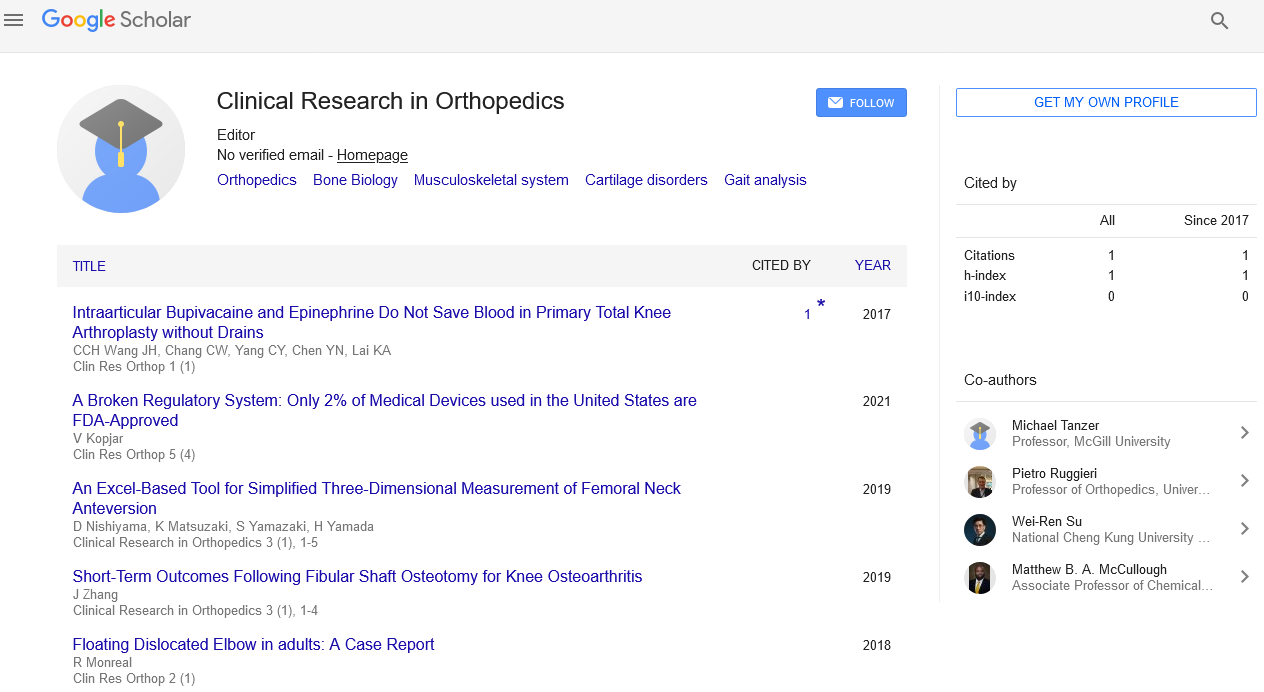Opinion Article, Clin Res Orthp Vol: 7 Issue: 2
Analyzing the Significance of Orthopedic Nursing in Patient Health and Recovery
Anurag Yadav*
1Department of Anaesthesia, Pain Medicine & Critical Care, AIIMS, New Delhi, India
*Corresponding Author: Anurag Yadav,
Department of Anaesthesia, Pain Medicine
& Critical Care, AIIMS, New Delhi, India
E-mail: anuragyadav@gmail.com
Received date: 22 May, 2023, Manuscript No. CRO-23-107086;
Editor assigned date: 24 May, 2023, PreQC No. CRO-23-107086 (PQ);
Reviewed date: 08 June, 2023, QC No. CRO-23-107086;
Revised date: 16 June, 2023, Manuscript No. CRO-23-107086 (R);
Published date: 26 June, 2023 DOI: 10.35248/cro.1000085
Citation: Yadav A (2023) Analyzing the Significance of Orthopedic Nursing in Patient Health and Recovery. Clin Res Orthp 7:2.
Description
Orthopedic nursing plays an essential role in the comprehensive care and management of patients with musculoskeletal conditions, injuries, and post-surgical procedures. It is a specialized field that focuses on promoting patient health, mobility, and recovery while providing support and education to patients and their families. Orthopedic nurses are well-trained to address a wide range of musculoskeletal issues, from fractures and joint replacements to spine disorders and sports injuries.
Orthopedic nurses perform a thorough assessment of patients, taking into account their medical history, current musculoskeletal condition, and overall health. This assessment helps in developing individualized care plans that cater to the specific needs and requirements of each patient. By understanding the patient's unique circumstances, orthopedic nurses can deliver targeted interventions that enhance health and support a faster recovery.
Before undergoing orthopedic surgery, patients often experience anxiety and uncertainty. Orthopedic nurses play a vital role in preparing patients for their procedures by providing detailed preoperative education. They explain the surgical process, potential risks, and postoperative expectations. This preparation helps alleviate patient fears and empowers them to actively participate in their recovery journey. After orthopedic surgery, patients require diligent postoperative care and monitoring. Orthopedic nurses closely observe patients' vital signs, surgical wounds, and pain levels to identify any signs of complications or infections. They work collaboratively with the healthcare team to manage pain effectively and ensure a smooth recovery process.
One of the important aspects of orthopedic nursing is encouraging and facilitating the early mobilization of patients. Orthopedic nurses assist patients with their initial movements after surgery and guide them through rehabilitation exercises to regain strength and mobility. This proactive approach significantly contributes to faster recovery and reduced complications.
Effective pain management is paramount in orthopedic nursing. Patients often experience pain following injuries or surgical procedures, which can impede their recovery and overall well-being. Orthopedic nurses employ various pain management techniques, such as administering medications, using ice or heat therapy, and implementing non-pharmacological methods, to ensure patients are comfortable throughout their healing process.
Orthopedic nurses are skilled in identifying potential complications that may arise during the recovery period. They implement preventive measures to reduce the risk of Deep Vein Thrombosis (DVT), pressure ulcers, infections, and other postoperative complications. This proactive approach enhances patient safety and contributes to better overall outcomes. Orthopedic nurses educate patients and their families on postoperative care, including wound care, medication management, and lifestyle modifications. By providing comprehensive self-care instructions, patients are empowered to take an active role in their recovery journey and maintain their health beyond the hospital setting.
Undergoing orthopedic treatment can be emotionally challenging for patients. Orthopedic nurses provide emotional support and empathy, creating a caring and nurturing environment for patients to express their concerns and fears. This compassionate approach fosters a positive patient experience and aids in the healing process.
Conclusion
Orthopedic nursing plays an indispensable role in ensuring optimal patient health and recovery in the field of musculoskeletal medicine. From preoperative education and postoperative monitoring to pain management, rehabilitation, and preventive care, orthopedic nurses address the diverse needs of patients with musculoskeletal conditions. Their expertise, compassion, and dedication significantly impact patient outcomes, contributing to improved quality of life and enhanced recovery. As orthopedic nursing continues to evolve with advancements in medical technology and patient-centered care, its significance in promoting patient health and recovery remains unparalleled. Through a multidisciplinary approach and a focus on patient-centred care, orthopedic nurses continue to make a significant difference in the lives of those they serve.
 Spanish
Spanish  Chinese
Chinese  Russian
Russian  German
German  French
French  Japanese
Japanese  Portuguese
Portuguese  Hindi
Hindi 